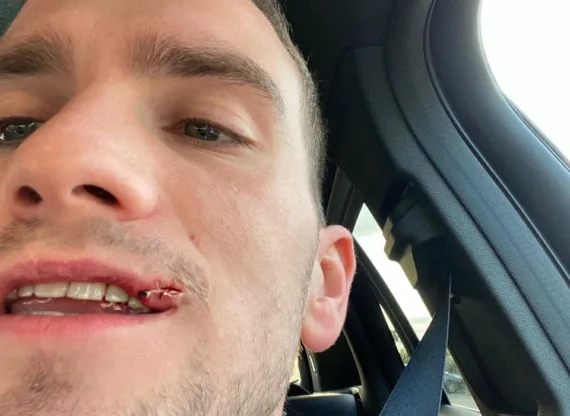Gay man called ‘f****t’ and left beaten and bloodied after being falsely accused of flirting

Ryan Kelly was assaulted in Douglas, Isle of Man.
A gay man has opened up about the horrifying moment he was called a “faggot” and punched in the face in a homophobic attack last month.
Ryan Kelly, who lives in Douglas, Isle of Man, was walking home after a night out when the attack occurred on January 18.
The 26-year-old was attacked by an Irish man in his 50s near St Mary’s Church, Isle of Man Today reports.
Ryan Kelly was punched in a homophobic attack after a man accused him of flirting.
“My phone was out of battery and I was trying to find a phone box around the area as I couldn’t be bothered walking home,” Ryan Kelly explained.
“At about 3am I bumped into this man who accused me of flirting with him. I just laughed it off, but he started getting more aggressive about it and said ‘you’re a faggot’. He then grabbed me and punched me.”
I try to put on a brave face. It really scares me that someone is walking out there doing that kind of damage.
Kelly said the perpetrator was “hammered” when the attack occurred. He was “very aware of blood” going down his face, but was unable to call police as his phone was dead.
He later ran to a taxi driver and asked them to call the police. He was taken to Noble’s hospital for treatment where he was given stitches on his lip.
Hate crimes are on the rise across the UK.
“I try to put on a brave face. It really scares me that someone is walking out there doing that kind of damage,” added Ryan Kelly.
“Homophobia is still out there. Being gay isn’t a choice for us,” he added.
Kelly reported the incident to police but said he has since dropped his complaint as there was no CCTV footage. He said that a lack of evidence would make it impossible to build a case against the perpetrator.
Figures released by the UK Home Office last year revealed that homophobic and transphobic hate crimes are on the rise. There was a 25 per cent rise in hate crimes based on sexual orientation between April 2018 and March 2019.
Meanwhile, anti-trans hate crimes surged by 37 per cent in the same period.

